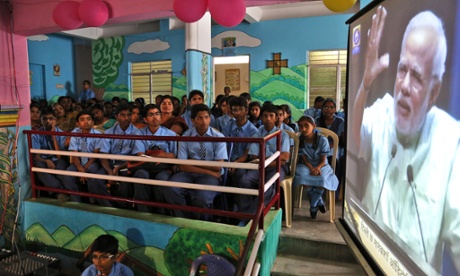
India’s prime minister, Narendra Modi, reportedly will be a no-show at the United Nations climate summit this month. Could it be because he does not accept the science behind climate change?
Modi used to be a supporter for climate action. But in public remarks on two occasions in the last week, the leader of one of the fastest growing – and biggest emitting – economies appeared to express doubt about whether climate change was even occurring.
“Climate has not changed. We have changed. Our habits have changed. Our habits have got spoiled. Due to that, we have destroyed our entire environment,” the rightwing leader told students in a video Q&A, according to India Today on Friday.
Modi was also vague on global warming and its causes in an interview with The Hindu a few days earlier.
“Climate change? Is this terminology correct? The reality is this that in our family, some people are old ... They say this time the weather is colder. And, people’s ability to bear cold becomes less,” he said.
“We should also ask is this climate change or have we changed. We have battled against nature. That is why we should live with nature rather than battle it,” he said.
Both sets of comments are at variance with Modi’s earlier views on climate change, set out in an e-book, published in 2011 when he was chief minister of Gujarat.
The e-book, called Convenient Action in an apparent tribute to Al Gore, frames action on climate change as a moral duty.
“Climate change is definitely affecting the future generations which, as of now, have no voice on the actions of present generation,” Modi wrote.
As Gujarat’s chief minister, he oversaw the final phases of construction of the hugely controversial Narmada dam. But he goes to great length in the e-book to promote his actions on climate change, expanding the use of solar and wind power, and switching to natural gas as fuel for vehicles.
In the book, Modi also took a swipe at climate deniers. “I remember, a few years ago, I used to read on lot of sceptic views of climate change, whether or not it was actually happening. Having been in public life, I am aware of behind-the-scene lobbying by vested interests that normally accompany any such carefully orchestrated campaigns.”
So what’s changed? Since his election, Modi has dismantled a number of environmental protections, clearing the way for new coal mines and other industrial projects. He also blocked funds to Greenpeace and other environmental groups and is known to be vehemently anti-NGOs.
But the real problem could be the fast rising pace of India’s emissions. In the past few months, the other giant emitters – China and America – have taken steps to reduce carbon pollution.
Projections from the Energy Information Administration show China’s emissions could start levelling off in 2030. India’s? They are due to rise by 60% between 2020 and 2040.
That could put Modi under some pressure on 23 September when the United Nations secretary general Ban Ki-moon convenes his climate summit of world leaders.
So while Modi has created confusion about his views on climate change, one thing seems clear: he does not want to have a conversation about what India plans to do about it.















